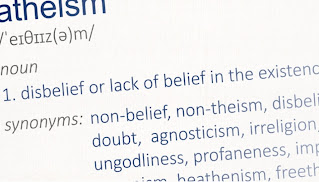What is or what is not an atheist.
This is for those of my friends, whether young and just discovering that they can question faith, or old and finally getting the nerve to think for themselves, who are slowly losing belief in God and considering if they should call themselves atheists. Such people will generally lurk around conversations about religion and God, follow known atheists, read books, and be bystanders in debates between theists and atheists, trying to decide whether one side has arguments logical enough to convince them of their viewpoint.
At the same time, because they normally would follow or look up to a known atheist for validation, the chances are this will be a popular personality who is well-known not just for their activism but also for being a good human, more or less (yes, they will have their faults, but would probably be counted in 'people I aspire to think like' by most outsiders). They would, of course, be smart, intelligent, articulate, sensitive, empathetic, and clued in to most thought that may be roughly be aligned to the leading edge of the moral and cultural zeitgeist of the society they are in. That may fool you into thinking that as a general rule, atheists are better humans.
I wish to disabuse you of that notion right away.
Being an atheist is not a guarantee of being a good human. Being an atheist, if anything, is not even a guarantee of being an atheist in the way most understand that word. Do look up Dawkins' spectrum of theistic probability (just type that in Google) and you will realise that there are grades, and everyone of us is somewhere on that scale.
(Side note: There is a difference in a claim of belief and that of knowledge. I explain it here, in case you are interested)
Now, back to our discussion about atheists as a homogenous group. To begin with, they are not. Atheism is not some blanket name for a social group or a formal club or cult has a book of rules, a head atheist, regular congregations, and/or a charter of acceptable and unacceptable acts for its members.
Atheism is disbelief or lack of belief in the existence of God or gods.
And an atheist is simply someone who does not believe there to be a supernatural entity who created the universe and is judging and manipulating every thought, word, and action by every human and animal, and is omnipotent, omniscient, and omnipresent but open to suggestion (prayer) and willing to suspend the laws of nature (made, undoubtedly by them) for the sake of a supplicant, self-confessedly undeserving. An atheist may or may not be sure of the existence or the non-existence of such an entity, but continues to live as if it does not exist.
But that does not mean that being atheist is not a get-out-of-jail-free card on every other subject.
Nothing in the definition of this word signifies that there aren't atheists who believe in other woo like homoeopathy, astrology, auras, palmistry, face-reading, vastu, feng shui, crystals, invisible pink unicorns, and so on. That also does not mean that all atheists are nice people. There are enough atheists who are paedophiles, or mass murderers, or rapists, or enjoy torturing small animals, or believe that race or caste is some sort of hierarchal pyramid of power on which they sit at the apex, or are members of the Nazi party or the KKK or what have you.
Just like not liking a particular colour or tv show or food item does not mean anything except not liking what you claim not to like, being an atheist is simply that. As a thumb rule, I would suggest you treat the word, 'atheist' literally and not as some kind of hidden messaging for the person's character, intent, or civility. When someone claims to be an atheist, I would strongly recommend to take away one and only one message from it about that person: that the person is an atheist (as defined in the dictionary).
And while you are here: There's probably no God. Now, stop worrying and enjoy life!
And if you are looking for perspective, you can find it here.
That's it! You are welcome.


Comments
Post a Comment
Comments to this blog are moderated. Please be patient once you submit your comment. It will appear soon...